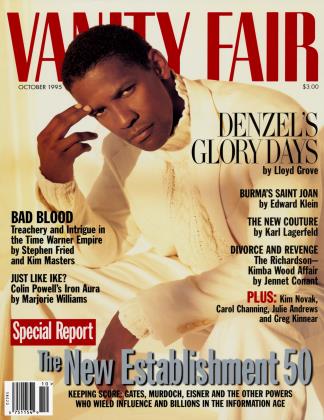Sign In to Your Account
Subscribers have complete access to the archive.
Sign In Not a Subscriber?Join NowEditor's Letter
The Lady Reappears
Contributing editor Edward Klein has traveled and reported extensively in Asia, first for U.P.I., then as Newsweek's foreign editor, and more recently for Vanity Fair stories on the Japanese royal family and Sony. Though Klein had never been to Burma, now called Myanmar, which was closed to journalists for many years, he had wanted to interview imprisoned political dissident Aung San Suu Kyi ever since she won the Nobel Peace Prize in 1991. The week she was released by the military regime which had kept her under house arrest since 1989, Klein flew to Rangoon. His report, "The Lady Triumphs," on page 120, chronicles the extraordinary courage of one woman, known to her countrymen simply as "the Lady," in mounting a challenge to a superstitious and reclusive tyrant—Ne Win—and the ruling State Law and Order Restoration Council.
Her story is part Nelson Mandela, part Benazir Bhutto. As with Mandela, her long incarceration gave her legendary status; like Pakistan's Prime Minister Bhutto, she was educated in the West, at Oxford, and her crusade was driven by the legacy of a martyred father.
As Klein watched Aung San Suu Kyi make her first public appearances, he noticed the difference between the private woman and the political figure. "Oneon-one," he says, "she is a much shier, reticent person. In public she comes alive, her facial expressions change." Despite her enormous popularity, Aung San Suu Kyi's situation is still precarious. Klein found the Burmese living "under a reign of invisible terror. It seemed everyone had lost some relative in the crackdown of 1988-89, when as many as 3,000 people were massacred, at least four times the number killed in Tiananmen Square. People are afraid to talk. They assume they are being watched by military intelligence, which has tentacles everywhere."
Still, Klein believes that Suu has only become more prepared and seasoned for the task she faces. "The people who knew her in England recall her as being rather arrogant, haughty, and a bit on the condescending side. These qualities all seem to have been burned away in the crucible of her six years of lonely house arrest. She has emerged as a figure of moral authority who is clearly willing and ready to sacrifice everything for the ideal of restoring democracy to her homeland."
 View Full Issue
View Full Issue












Subscribers have complete access to the archive.
Sign In Not a Subscriber?Join Now